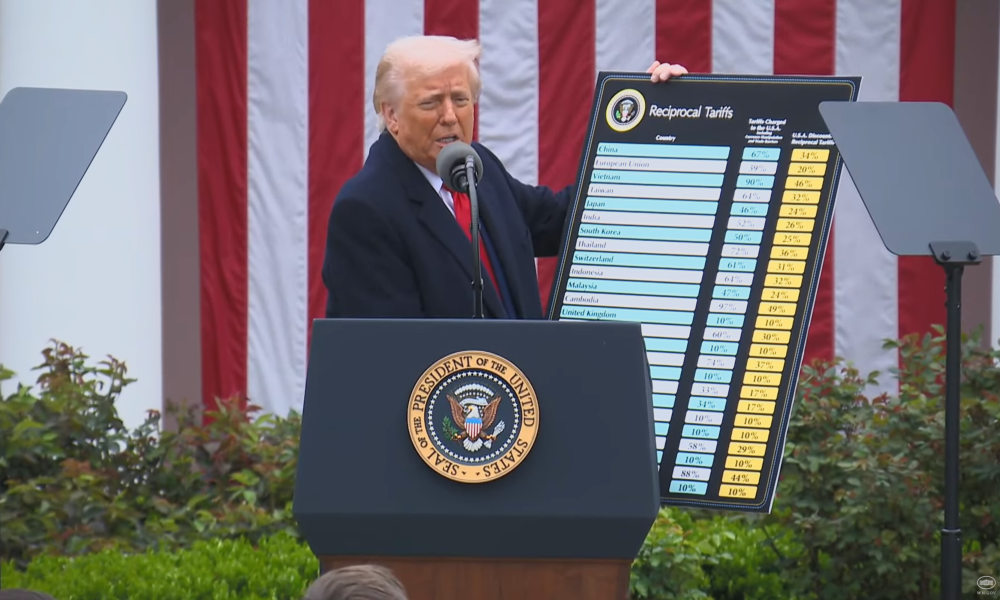Politics
Trade court overturns Trump global tariffs

The U.S. Court of International Trade has struck down a sweeping set of tariffs imposed by President Donald Trump, ruling that his administration exceeded its legal authority under the International Emergency Economic Powers Act (IEEPA). The Trump administration has since filed an appeal.
The decision, issued on Wednesday, vacates the tariffs entirely and permanently enjoins the government from enforcing them, delivering a major setback to the administration’s trade agenda.
The case arose from two lawsuits: one brought by a group of small and mid-sized businesses, and another by thirteen states, including Oregon, New York, and Arizona. The plaintiffs challenged two sets of executive orders issued by President Trump, which imposed tariffs on goods from China, Canada and Mexico.
The administration argued the tariffs were necessary to combat international drug trafficking and address long-standing trade deficits threatening national security.
In their ruling, Judges Gary S. Katzmann, Timothy M. Reif, and Jane A. Restani found that the president’s actions exceeded the authority granted to him by Congress. The court said IEEPA permits the president to regulate certain transactions during a declared national emergency, but it does not authorize the imposition of broad, unrestricted tariffs for general economic purposes.
The court stated that the constitutional power to impose tariffs belongs to Congress, and that any delegation of that power must include meaningful limits.
The judges ruled that the so-called “Trafficking Tariffs” failed to meet the statutory requirement that such measures be used only to “deal with” a specific threat. Instead, the tariffs aimed to pressure the governments of China, Mexico, and Canada into adopting stronger enforcement policies.
According to the court, this kind of indirect leverage strategy fell outside the scope of IEEPA. The court wrote that there must be a direct connection between the emergency threat and the action taken, which was not present here.
The second set of tariffs, dubbed the “Worldwide and Retaliatory Tariffs,” were similarly struck down. These measures imposed blanket duties on nearly all imports, with higher rates for countries accused of unfair trade practices.
The court said these actions were not tied to any “unusual and extraordinary threat” as required by law, but instead were an improper use of emergency powers to pursue broad economic goals better handled through non-emergency statutes like the Trade Act of 1974.
The ruling also dismissed the administration’s argument that such presidential decisions are beyond judicial review. The court noted that it is empowered to determine whether executive actions comply with statutory authority, particularly when those actions have widespread legal and economic consequences.
“IEEPA does not grant the President unlimited tariff authority,” the judges wrote, calling the administration’s interpretation “unbounded” and inconsistent with both the law and the Constitution.
The court further held that the relief must apply uniformly nationwide, citing the constitutional requirement that all duties and taxes on imports be applied equally throughout the United States. As a result, the ruling not only protects the plaintiffs in the case but bars enforcement of the tariffs against all importers.
The court ruled in favor of the plaintiffs and formally struck down the tariff orders, ending the policy. It also dismissed earlier requests to block the tariffs on an emergency basis, finding them no longer necessary.
Shortly after the ruling, the Trump administration filed an appeal with the U.S. Court of Appeals for the Federal Circuit. While the government is seeking to overturn the decision, the tariffs remain vacated unless a higher court issues a stay.

-

 World5 days ago
World5 days agoEthiopian volcano erupts for first time in thousands of years
-

 Legal2 days ago
Legal2 days agoUtah Amber Alert: Jessika Francisco abducted by sex offender in Ogden
-

 Legal1 week ago
Legal1 week agoWoman in critical condition after being set on fire on Chicago train
-

 US News1 day ago
US News1 day agoExplosion destroys home in Oakland, Maine; at least 1 injured
-

 World1 week ago
World1 week agoHurricane Melissa registered 252 mph wind gust, breaking global record
-

 Legal1 week ago
Legal1 week agoSuspect in San Diego stabbing shot by authorities after fleeing into Mexico
-

 Legal1 week ago
Legal1 week ago1 dead, 2 injured in shooting at Dallas Walmart parking lot
-

 Health2 days ago
Health2 days agoMexico’s September human bird flu case confirmed as H5N2



